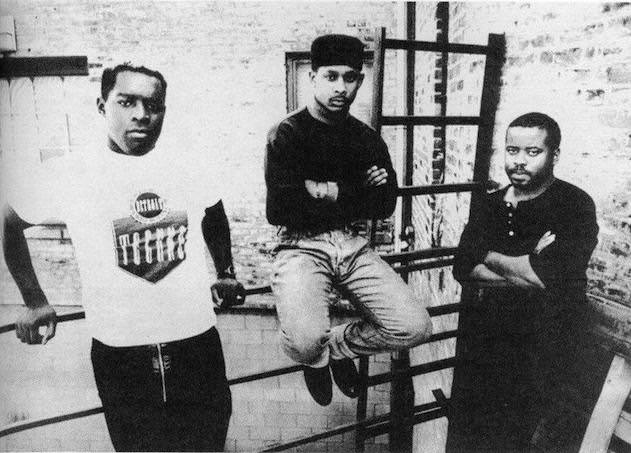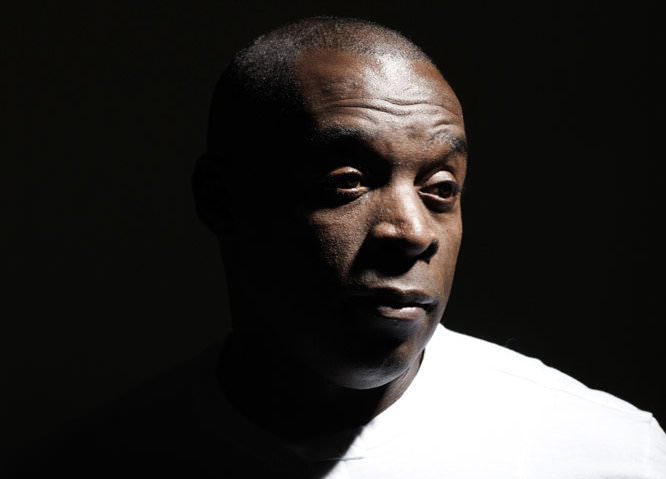
Saunderson circa 1988, with Derrick May and Juan Atkins
Maybe some of the younger fans you have now might not realise the impact tracks like those had as a crossover success.
Right. I look at the scene now and I see groups like Disclosure, I see MK – who came up under me – I see how they’re having success with vocals, with house music, with deep house, however you want to call it, and these new generations, yeah, they do think it’s new. But I think it’s great because back in the day my vision was just that I was making music because I loved vocals, I loved the underground, I loved it all. I did have a goal – I thought that everybody should be able to dance as one. There’s no colour in this music, it’s for everyone. When I started making music – a lot of young kids won’t know – this music was only for black kids from America. That’s the only people that came out and danced to this music. That’s the roots. It was made by black artists like myself and Derrick and Juan. Are you familiar with fraternities?
Yeah.
OK, so I went to school at Eastern Michigan. I was in a fraternity, which was a black fraternity, then you had your white fraternities – that’s just the way it was on campus. So I used to go to these parties and I’d be looking at all the white fraternity groups and it’d be packed. I’m wishing I could go play my music, wishing I could DJ. I’m thinking like, this music is for everybody. At the time they’re listening to rock’n’roll, heavy metal, maybe some new wave, and drinking beer – it wasn’t about dancing. So now the whole world has been exposed and it is for everybody. Music is music. What’s great is great, no matter what.
At what point did the racial mix start to change in America?
America… There’s been a few pockets, but… I hate to say this but EDM has brought more recognition to the underground. What happened is these kids – even my kids – they went from hip-hop to EDM, then they started finding out about people like me, Richie Hawtin, Jeff Mills, Carl Cox. The imprint’s been going on in America but it hasn’t had the impact on the underground. Then we had the RAVE Act in America too, where clubs doing gigs, having parties were really shut down. But now, what really kicked that off is festivals. Especially Movement. That opened up a door for parents to say, ‘Well, I don’t want you to go to a club but I’ll let you go to a festival’. It’s daytime, it’s outside, so they felt like even though it’s in the City of Detroit it’s safe. Or safer. That had an impact and then it became regional, so now you have multiple festivals going on and it’s impacted the club scene. You’ve got this whole big circle of electronic music now and it’s huge. You might think, ‘OK, finally America’s caught on’ but I think they have caught on now. It’s mixed up now, it’s not like everybody knows about all the music, but you’re gonna have sides that stick to a certain sound.
I’ll give you an example. I did a Skrillex remix – Skrillex and Boys Noize, Dog Blood. Obviously his fans aren’t used to hearing techno mixes of his records. All these people like, ‘What the heck is this?’. Some were hating because they only know one way and they’re young, but some were like, ‘Wow, that’s kind of interesting’. It just shows me how doors are opening in America and things are changing slowly.
You might think, ‘OK, finally America’s caught on’ but I think they have caught on now.
I don’t mean to dwell on the subject of race, but as you brought it up I’m curious to know how different your experience was in the UK. You were obviously part of the first group of artists to come over here and promote house and techno in the late 80s. Was it always much more mixed over here?
Oh, definitely. Added to that I didn’t feel there were any racial barriers like in the States. I feel like the music was accepted as music here in the UK, always. That’s how the UK scene took off too. UK promoters, producers and DJs were so inspired by the music that you ended up creating your own scene. In general, I always felt like it was pretty wide open.
It must have felt quite different, then?
It was like, ‘Why can’t it be like this everywhere?’. It was definitely that way. You could go to a club, it was a mixture of people, nobody was worried about no violence and everybody seemed like they were on one level. It wasn’t even all young, it was a mixture. I seen people back then when I was first coming here, the executives and A&Rs dancing in the crowds, big label wigs. They were in the crowd as well, partying. That was unique. You’ll never see that in America. Not in our scene.
Coming to the UK, it was like, ‘Why can’t it be like this everywhere?’.
How did you feel about the fame that you got? Was that something you aspired to? Did you want to be a celebrity?
No, no. I didn’t even want to come out of the studio. I got talked into it because of the success of the records but I never planned it. I wanted to be a DJ and make music but I never thought about being on Top Of The Pops – I didn’t even know what that show was. That was never my vision, to be truthful. Even when we went out live the first time, it wasn’t my vision to create a band. It was just because of success and it came with the territory.
Did you enjoy it?
I enjoyed part of it. To me, my singer [Paris Grey] was the face, she was the character. She had ambitions like that where I didn’t, so it was getting in my way. Like I say, I could be in the studio working on a new album instead of touring. It was goofy. That was never for me, but we got through it. I understood it more as I got older too, why you need to do it.

05.36 AM
Top bloke!
06.45 AM
Some great insights. Thx
05.29 PM
Definitely the nicest and most grounded of all the Detroit guys. Class act all the way around. So glad he’s continued with the Inner City project.
03.31 PM
I’d go to Naples just for the pizza too. I think I’ll be playing his E-Dancer stuff until the day I die.
01.56 PM
Never heard of this guy before, glad I do know him now!
11.09 AM
Yea great interview! Love this mag.